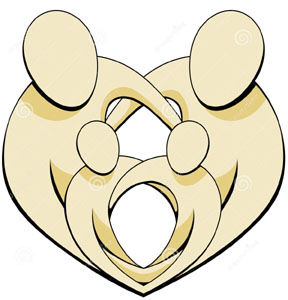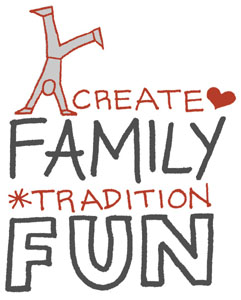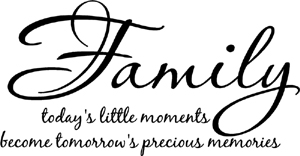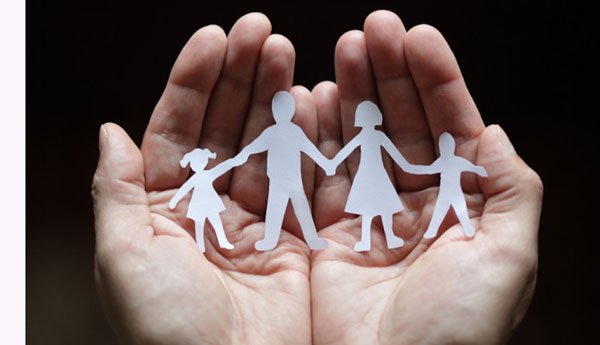Your Sticky Family
“The family… is a perpetual source of encouragement, advocacy, assurance, and emotional refueling…”
– Dr. Marianne E. Neifert, Dr. Mom’s Parenting Guide
 Families who have had young children in the house know what it means to have a “sticky” home. There is a phase in which everything you touch seems to has the startling stick of unwashed hands, spilled juice, melted candy or residue of unknown origin on them. It’s not sticky in a good way, but it is an accepted part of having a family.
Families who have had young children in the house know what it means to have a “sticky” home. There is a phase in which everything you touch seems to has the startling stick of unwashed hands, spilled juice, melted candy or residue of unknown origin on them. It’s not sticky in a good way, but it is an accepted part of having a family.
There is another type of “sticky family.” A family that sticks together during good times and hard times, a family whose values stick to them and a family whose life is stuck together by moments of shared fun and togetherness. This is a family with traditions, routines, rituals and creeds.
“Family traditions and rituals give people something to hang on to when life gets tough,” Erika Krull, MS, LMHP (2010) wrote. “When they can do these things together through thick and thin, they develop resilience. They learn that life goes on in spite of difficulty and enjoyment can still be had in the midst of challenges.”
A fifty year “study of family routines and rituals [by the] American Psychological Association’s (APA) Journal of Family Psychology review finds that family routines and rituals are powerful organizers of family life that offer stability during times of stress and transition…family routines and rituals are alive and well and are associated with marital satisfaction, adolescents’ sense of personal identity, children’s health, academic achievement and stronger family relationships” (Fiese, et al., 2002).
Sticky Stuff: Routines, Rituals and Creeds
“The bond that links your true family is not one of blood, but of respect and joy in each other’s life.”
– Richard Bach, Illusions
Psychologist Barbara H. Fiese (2002), Ph.D., and colleagues at Syracuse University said that “Routines involve instrumental communication conveying information that ‘this is what needs to be done’ and  involve a momentary time commitment so that once the act is completed, there is little, if any, afterthought,” like having a meal together or bedtimes—valuable little tick-marks of togetherness. “Rituals, on the other hand, involve symbolic communication and convey ‘this is who we are’ as a group and provide continuity in meaning across generations. Also, there is often an emotional imprint where once the act is completed, the individual may replay it in memory to recapture some of the positive experience” like holidays or vacations, but also things we may do at the family table or during bedtime. For example, prayers before sleep or for our family, at dinner or breakfast, we will do the “Family Fun Race.” Dinner is a routine but the Family Fun Race is a ritual in which we all take turns seeing who can come up with the most joyful moments we had that day, or if at breakfast, the day before. You’re welcome to borrow it—it helps everyone maintain a positive perspective.
involve a momentary time commitment so that once the act is completed, there is little, if any, afterthought,” like having a meal together or bedtimes—valuable little tick-marks of togetherness. “Rituals, on the other hand, involve symbolic communication and convey ‘this is who we are’ as a group and provide continuity in meaning across generations. Also, there is often an emotional imprint where once the act is completed, the individual may replay it in memory to recapture some of the positive experience” like holidays or vacations, but also things we may do at the family table or during bedtime. For example, prayers before sleep or for our family, at dinner or breakfast, we will do the “Family Fun Race.” Dinner is a routine but the Family Fun Race is a ritual in which we all take turns seeing who can come up with the most joyful moments we had that day, or if at breakfast, the day before. You’re welcome to borrow it—it helps everyone maintain a positive perspective.
Both routines and rituals add stability, predictability and emotional connectedness to the family “which can lead to better parenting, healthier children and improved academic performance” no matter the makeup . “The presence of family routines under conditions of single parenting, divorce, and remarried households may actually protect children from the proposed risks associated with being raised in nontraditional families,” according to Dr. Fiese (2002).
 While stability and connectedness are key to family health, a family also benefits from a foundation and a direction, which can be fostered by a family motto, or creed. In the Seven Habits of Highly Effective Families, world famous author Stephen R. Covey gives several reasons for the importance of writing a Family Creed (or mission statement). “Family creeds (or mission statements) define your destination and help your family to create a vision. Without vision or a destination in mind is to have no mental creation, no envisioning of the future-to just let life happen, to be swept along with the flow of society’s values and trends without having any sense of purpose” (Covey, 1998).
While stability and connectedness are key to family health, a family also benefits from a foundation and a direction, which can be fostered by a family motto, or creed. In the Seven Habits of Highly Effective Families, world famous author Stephen R. Covey gives several reasons for the importance of writing a Family Creed (or mission statement). “Family creeds (or mission statements) define your destination and help your family to create a vision. Without vision or a destination in mind is to have no mental creation, no envisioning of the future-to just let life happen, to be swept along with the flow of society’s values and trends without having any sense of purpose” (Covey, 1998).
There is a self-sustaining aspect here that can be overlooked by parents. We think we are creating these things “for the kids” but in truth, it’s for us just as much. A family creed helps with parenting—pointing to it when there needs to be correction, using it to guide something fun like a family vacation, or as a touchstone in challenging times. “It is likely that competent parents are more effective in creating family routines,” Dr. Fiese (2002) said, “and that satisfying routines provide a sense of competence” for the parent and trust from the children. Mrs. Krull (2010) strikes to the heart of it. “Your experience deepens because you get to reinforce what you value the most. It’s a wonderful mutually beneficial process.”
Sticking to it
“A family in harmony will prosper in everything.”
– Chinese Proverb
Rituals, routines and creeds may seem daunting to start in the beginning, but according to statistics it takes American families around 20 minutes to share a meal and the benefits can last a lifetime (Fiese, 2002). Other rituals just happen naturally like birthdays or traditional vacation spots—the meaning that we build into them is what gives them power.
The same naturally occurring imbuing of power enlivens our family creeds. Covey (1998) said that it is simply “a combined, unified expression from all family members of what your family is all about – what it is you really want to do and be – and the principles you choose to govern your family life.” The Declaration of Independence for our families can be written in a moment.
Mrs. Krull (2010) offered a final encouragement that these rituals, though great fun aren’t “just a personal indulgence.” We should “celebrate them with a full heart” and a full understanding that they have the power to be the strongest, stickiest “thread being woven into your family tapestry.”
__________________________________________________
Covey, S. (1998) The 7 Habits of Highly Effective Families. Retrieved from: http://www.rrls.org/files/swojslaw/Image/111724_Family_Creed_Exercise.pdf
Fiese, B., Tomcho, T. Douglas, M., Josephs, K., Poltrock, S. & Baker, T. (2002) A Review of 50 Years of Research on Naturally Occurring Family Routines and Rituals: Cause for Celebration? Journal of Family Psychology, Vol. 16, No. 4.Retrieved from: http://www.apa.org/news/press/releases/2002/12/rituals.aspx
Krull, E. (2010) Family Traditions And Rituals – More Than Just Family Fun. Psyche Central. Retrieved from: http://blogs.psychcentral.com/family/2010/09/family-traditions-and-rituals-more-than-just-family-fun/


